MUKURUKURU MEDIA
The promised land where dreams are ground down into coal dust
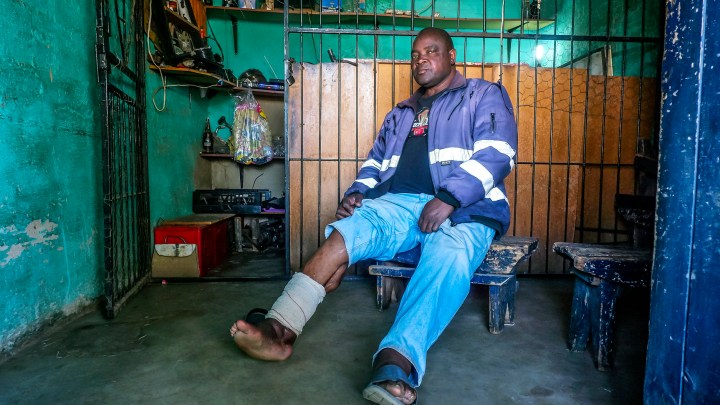
They came from all over southern Africa to the coal mines of Mpumalanga, hoping for a better life. Now these men are old and sick and living in hope that they will get compensation from the mines that broke them.
The coal-stained clouds of Phola township in Ogies, Mpumalanga, paint a picture of a town deeply entrenched in its industrial roots. The streets are filled with young and old people clad in the work overalls of one of the many mining companies that operate or have operated in the area.
It is the quintessential image of a place created to become the home of labouring workers struggling to fill their stomachs. One of those workers is Francis Ngobeni.
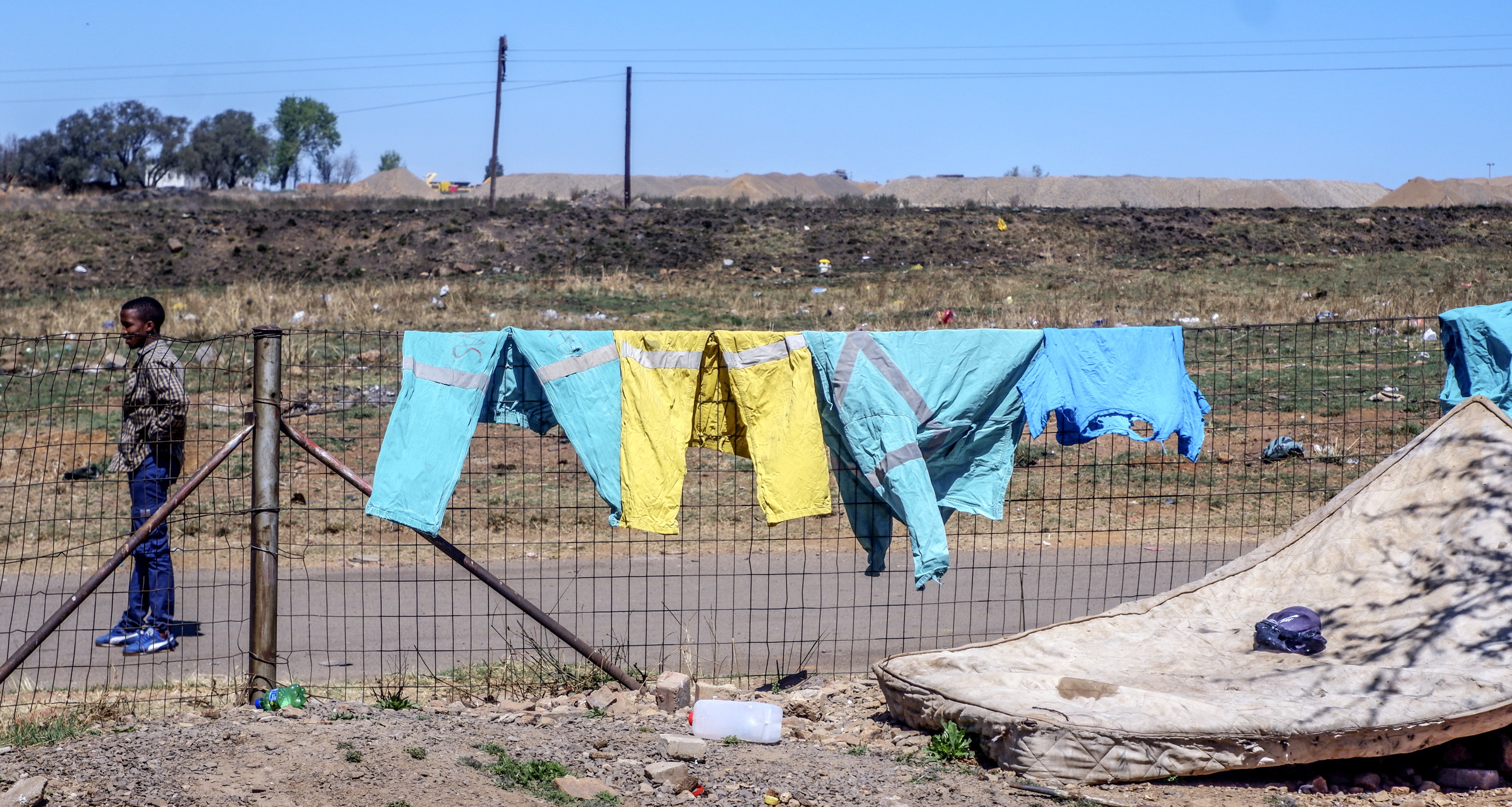
Overalls hang on a fence in Rietspruit, Mpumalanga. (Photo: Tshepiso Mabula ka Ndongeni)
The Mozambican-born, former coal miner lives on an abandoned farm in Rietfontein near Phola. The farm is a dull, monochrome open space whose residents are mostly immigrants from different parts of southern Africa.
On the farm are wood and mud houses that reflect the existence of many who survive on the periphery. Ngobeni, whose family still lives in Mozambique, came to South Africa in search of opportunities.
He found work in one of the many coal mines that dot the Mpumalanga landscape.
Ngobeni worked on the mines for many years, he says, starting in 1976. He stresses that he has no education, and this made it easier for mining bosses to exploit him and others. When asked how old he is, he points out that the exact date of his birth often escapes him.
“Ngizalwe ngabo ’53 [I was born sometime around 1953],” he says.
Sprouts of grey strands peeking out of his hair and beard reflect his seniority. When he speaks about the difficulties he faced while working underground there is a shift in his tone, one of being unsure whether to be happy or sad.
“Work was work. We were just happy to earn a living but the conditions were bad because they did not care for our safety. We only started getting dust masks and other PPE [protective clothing] after 1994,” he remarks.
Under apartheid, many black workers endured shocking exploitation, including being forced to work underground without the appropriate safety gear. Today many struggle with respiratory ailments.
It is believed that many former coal miners like Ngobeni have pneumoconiosis, also known as black lung disease, as a result of long-term exposure to coal dust. But these suspicions can only be proven after the workers have undergone the proper testing protocols, which will be facilitated by the SA Catholic Bishops’ Conference (SACBC) Justice and Peace Commission.
Pneumoconiosis is an incurable respiratory disease that causes the loss of blood vessels and air sacs in an individual’s lungs and makes it difficult to breathe and get enough oxygen into the body.
There is a sense of grief in Ngobeni’s voice as he recalls the many years of his life that he gave to the mining companies he worked for. It recalls the mournful laments from Stompie Mavi’s classic song Teba, in reference to The Employment Bureau of Africa, the recruitment agency for South African mines since the 1960s.
Mavi sang:
“Lomlungu uTeba ngokwenene ndiyamzonda
ngob’uthath’isthandwa sam
andisoze ndiye Egoli.
[This white Teba I really hate
because you took my lover
I will never go to Johannesburg.]”
These words describe the tale of men like Ngobeni perfectly; men who left their homes in search of a better life, hoping to return with newfound wealth. Instead, the cities devoured them and spewed them out, old and penniless and with nothing to show for the sacrifices they made.
Ngobeni was retrenched from Glencore mine in 2014, paid out R20,000 and sent on his way. He says that among the many ailments afflicting his body as a result of working on the mines for years, his eyes are the most affected.
“I don’t see very well, and I have high blood pressure, but there is nothing I can do about it at this point,” he says.
He depends on collecting tin cans to recycle and earning a pensioner’s grant, which he sends home to his wife who suffered a stroke a few years ago.
Father Stan Muyebe, the head of the SACBC Justice and Peace Commission, says the feasibility of a compensation lawsuit for coal miners is yet to be determined. However, he hopes that the exploratory process will yield fruitful results and provide the comfort that is necessary for men like Ngobeni to finally live out their elder years in peace.
Phola township is a myriad of contradictions. From the scenic mountains alongside illegal dumping sites with black smoke rising from burning rubbish, to the festive mood in the streets thronged with beer-clasping youths and playful children against a backdrop of rudimentary shacks.
This township paints the picture of a people haunted by the burden of dreams deferred. One such person is Zacarias Chirindza. Chirindza, also a Mozambican national, lives in a two-bedroom shack in the township. From his humble home, one can see mine shafts in the distance, set amid green hills; this view distracts from the harsh realities that make up Chirindza’s life.

Zacarias Chirindza in the living room of his home in Ogies, Mpumalanga. (Photo: Tshepiso Mabula ka Ndongeni)
After realising that there was very little employment and opportunity for young school dropouts like him, Chirindza went to South Africa. Like many Mozambican nationals, he was recruited through Teba and started working on the mines as a teenager.
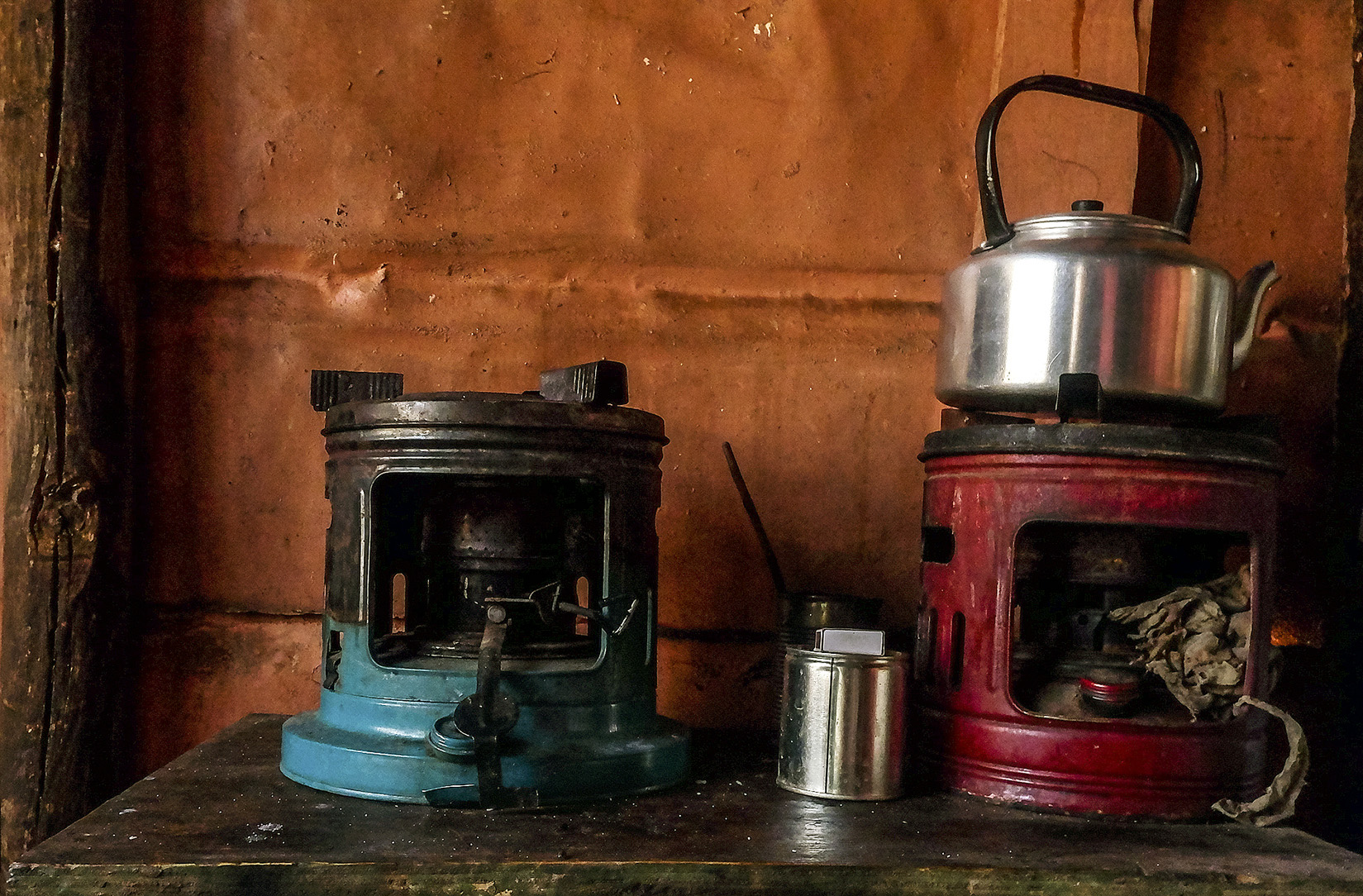
Items from Zacarias Chirinze’s kitchen in Ogies, Mpumalanga. (Photo: Tshepiso Mabula ka Ndongeni)
Chirindza is among the many men unfortunate enough to be at the intersections of labourer and immigrant, both of which have been dealt with severely by history. Besides the hardships of being poor, jobless and without a solid place to call home, these men also deal with the consequences of working for many years in the coal mines without adequate safety materials.
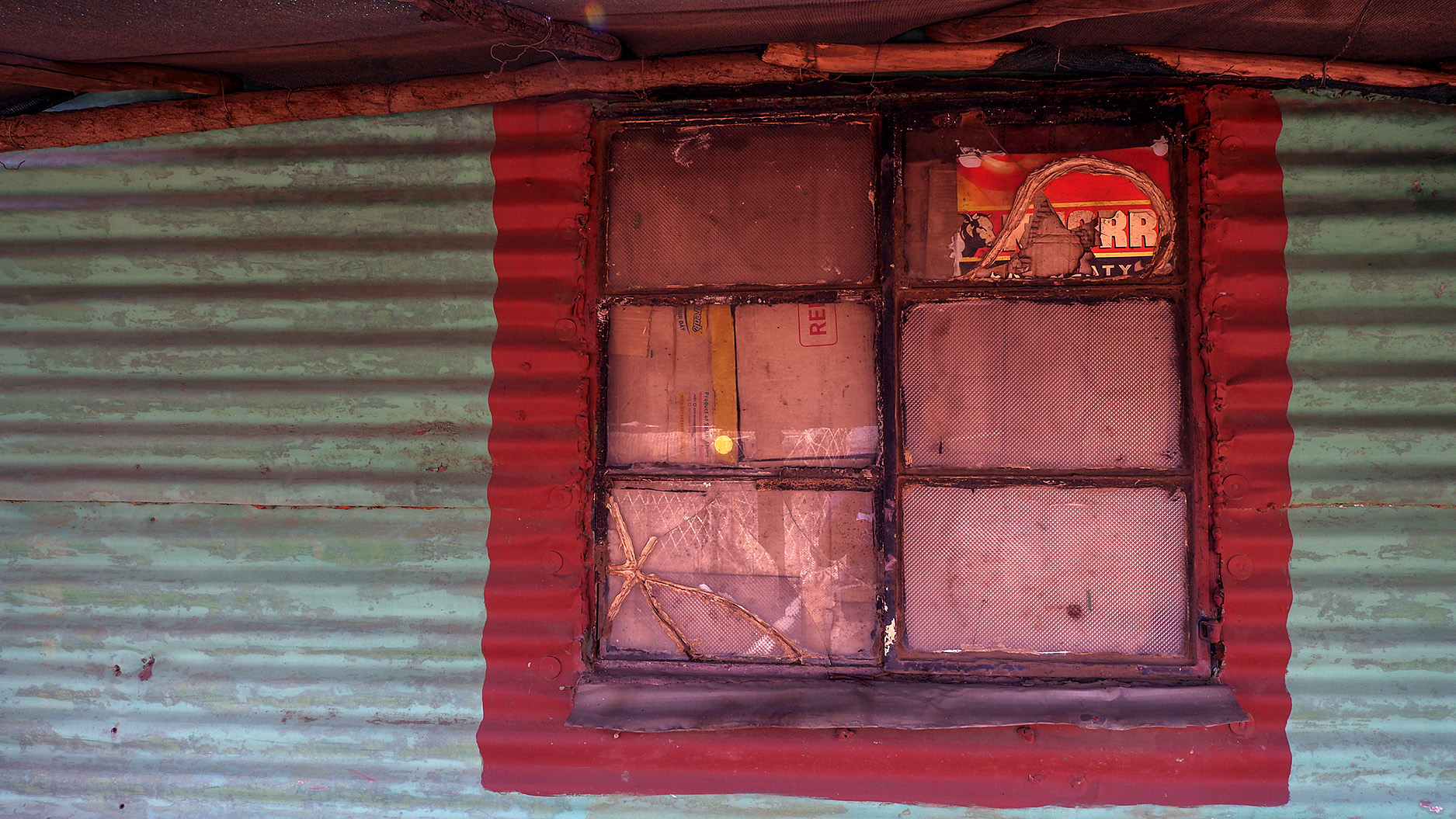
The window is covered with a cardboard box and tape at Zacarias Chirindza’s home in the Phola township, Ogies. (Photo: Tshepiso Mabula ka Ndongeni)
They struggle with respiratory complications which have yet to be tested. Chirindza complains that he was not adequately compensated even though he gave the best years of his life to the mines.
“I walked away with only R4,000 and I have not been paid in full. When I started working I was fine. The job made me sick. But I was willing to work anyway because I had a family to look after,” he says.
On the outskirts of Rietspruit is a quiet township overlooking the tainted landscape of the province of the rising sun, Mpumalanga. Here Salomao Carlos Macamo, 67, lives with his family in a humble home alongside the main road where coal-filled trucks run back and forth every day.
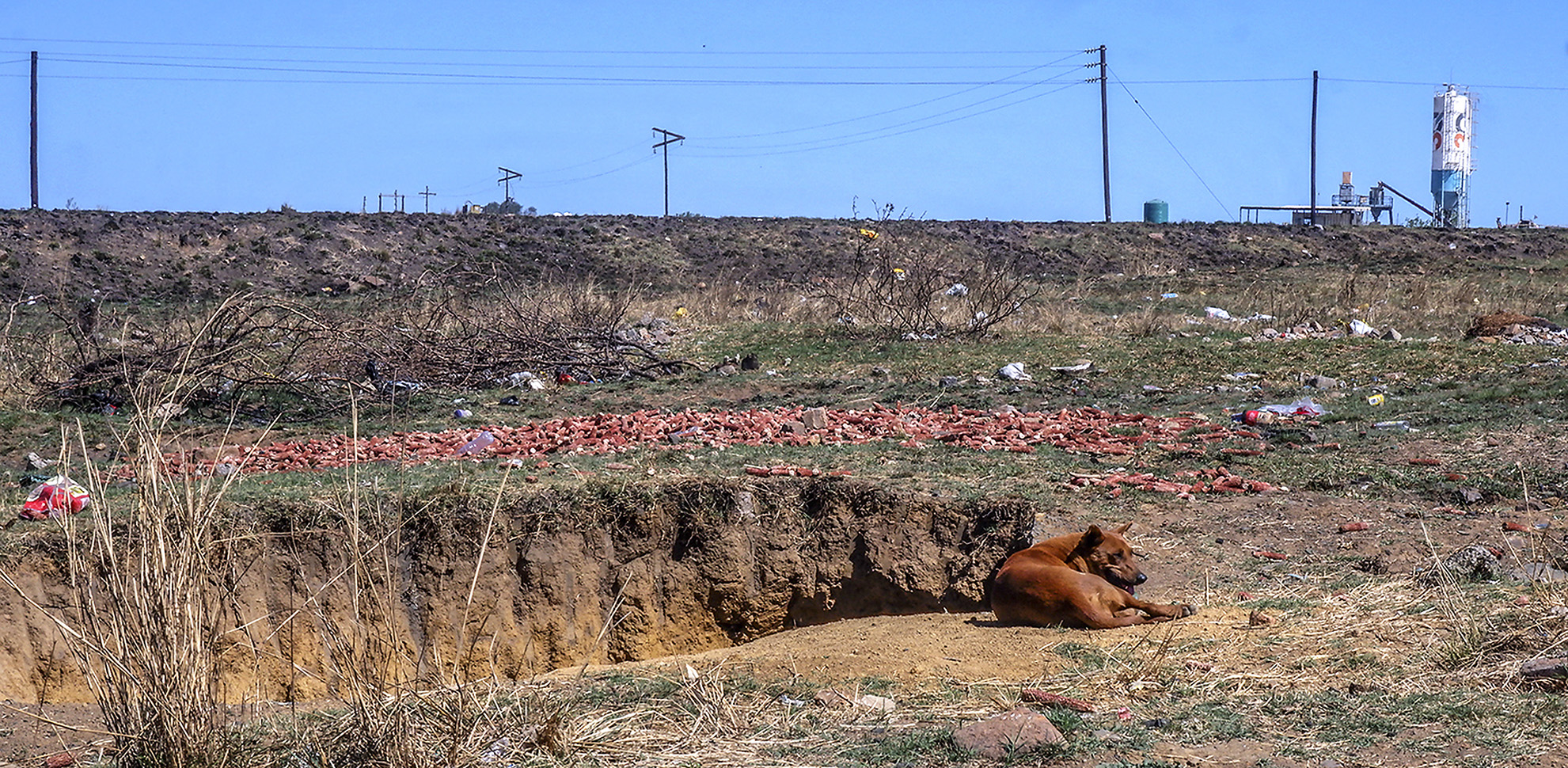
A dog lies next to the road outside Salomao Carlos Macamo’s house in Mpumalanga. Trucks carrying coal can be seen driving from the mines to the main road. (Photo: Tshepiso Mabula ka Ndongeni)
Macamo was born in Mozambique and he too came to South Africa as a young man to seek employment on the mines that promised a better life. Now, he struggles to walk because of an injury he sustained while working underground as a drill operator more than 25 years ago.
“After giving so much to these people now it feels as if I have no life,” Macamo says.
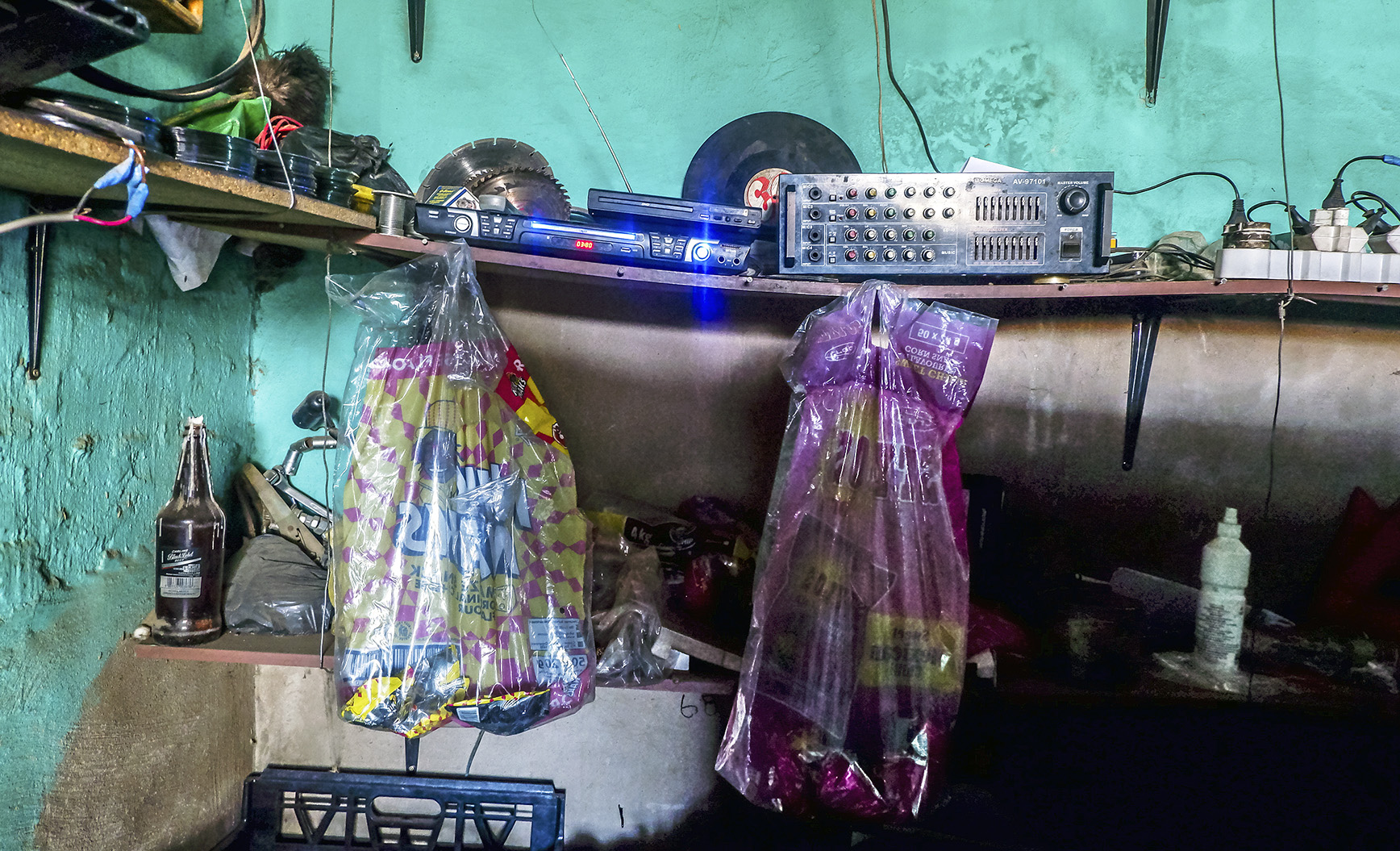
A tuckshop inside the yard of Salomao Carlos Macamo. (Photo: Tshepiso Mabula ka Ndongeni)
He is confined to his home because of his injury and says he tries to provide for his family with the income from the small tuckshop he operates from his home. He is unable to walk and relies on his old van to get around.
“Every form of dignity I had was lost when I lost that job. I visited my family back home in Mozambique, but now I can’t because l have no money,” says Macamo.
Though they have found hope in working with the SACBC Justice and Peace Commission, whose advocacy group is exploring how to secure justice for the sick coal miners, they are still waiting.
The story of Ngobeni, Chirindza, Macamo and many like them is one of perpetual violence inflicted on black, uneducated and poor labourers. It is the constant exploitation of those who are the backbone of our country’s economy.
It is the story of Hugh Masekela’s never-returning Stimela, that steals fathers from their children and brings them back as hopeless and broken old men. It is echoed in the lyrics of Stompie Mavi’s Teba, about the broken promises that snatched husbands from their wives:
“Uzubathuthe loliwe Uzubathuthe loliwe,
bathuthe loliwe andi soze ndiye eGoli.
[You will take them to the train,
they will take me to Johannesburg.]” DM/MC


















 Become an Insider
Become an Insider
I accept many comments about exploitation etc. in the mines, in my opinion, all underground workers are exploited, I think no compensation is sufficient to cover the physical hardship and dangerous working conditions they endure. But frequent accusations that black workers were treated differently with regard to safety and safety gear I reject – my first year of work, at the height of apartheid, was spent working in a gold mine on the West Rand. Conditions were tough for all who worked in the mines – black workers were largely exploited to do the most physical labour with very little monetary compensation. But I really cannot accept the frequent claims that black workers were “forced to work without safety gear”. Safety was always very strictly applied to all workers. Management – from Shiftboss level right up to General manager were obsessed with enforcing safety rules. Ignoring safety regulations was considered to be the most heinous crime a miner could commit. Management bonuses were dependent on accident free records in their sections. To be awarded a Chamber of Mines Fatality free wristwatch was an enormous accolade and the recipients wore them with great pride. A huge slice of a Mine’s budget was for safety apparel and equipment, which was issued to all workers irrespective of race.